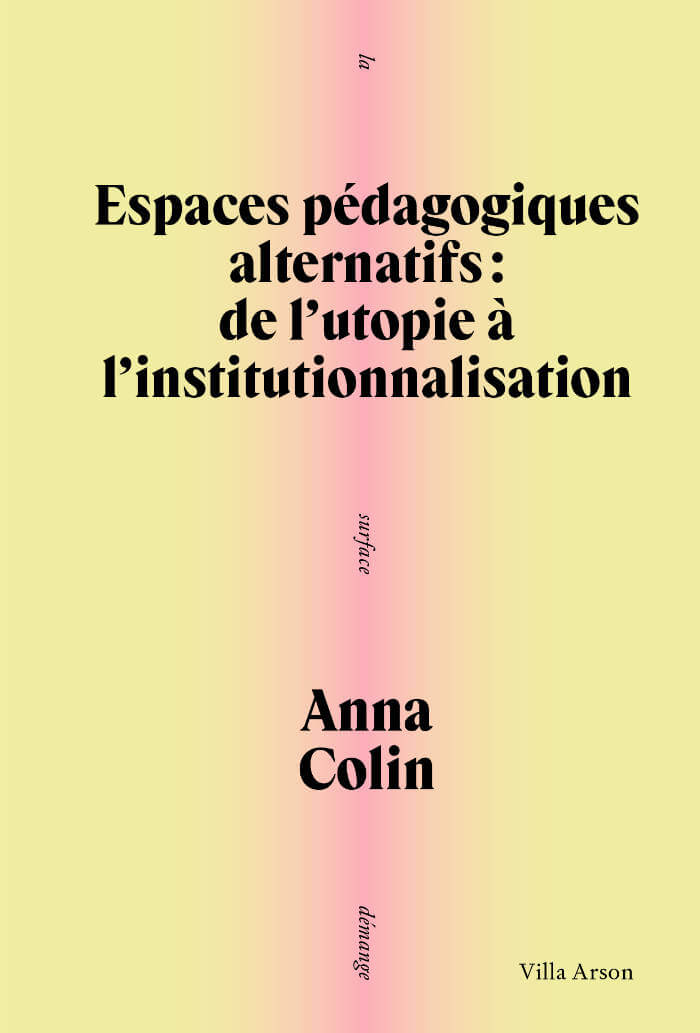Anna Colin
Anna Colin

Espaces pédagogiques alternatifs
A critical exploration of the values and qualities inherent in independent educational organizations and the hurdles in the way of remaining "alternative" with the passing of time.
Anna Colin is programme director of the MFA Curating and co-director of the Centre for Art and Ecology, Goldsmiths, London. Besides Open School East, Anna worked as associate curator at Lafayette Anticipations, Paris (2014–20), associate director at Bétonsalon, Paris (2011–12), and curator at Gasworks, London (2007–10). She co-curated Chaleur Humaine, the 2nd Dunkirk Art & Industry Triennale (2023–24) on the relationship between energy and the arts since 1973. She holds a PhD in cultural geography and has a training in arboriculture.
Edited by Céline Chazalviel, Alice Dusapin, Sophie Orlando.
Texts by Anna Colin and Catherine Quéloz.

Alternative Pedagogical Spaces – From Utopia to Institutionalization
A critical exploration of the values and qualities inherent in independent educational organizations and the hurdles in the way of remaining "alternative" with the passing of time.
Grounded in empirical research, Alternative Pedagogical Spaces: From Utopia to Institutionalization is a critical inquiry into the establishment, development, and transformation of alternative pedagogical and social spaces. Written by Anna Colin, a former director and co-founder of Open School East, an independent art school and community space founded in London in 2013, this essay-length book explores the instituting factors, organizational life cycles, and alignments and misalignments between values and practices that permeate such a project. The essay delves into the qualities and prerequisites for what Colin calls "multi-public educational organizations." It also scrutinizes the hurdles associated with the effort to remain alternative, including processes of habituation, temptation or pressure to scale up, ethos-bending fundraising exercises, and long tenure, as well as the plain desire for stability and sustainability.
Alternative Pedagogical Spaces proposes where to look for a reconceptualization of waiting, slowness, and longevity, and asks how these ideas may benefit cultural practice and the design of future institutions (or the redesign of existing ones). Overriding the common assumption that success equals longevity, the author searches for institutional models that resist chrononormativity, drawing from social movements, psychotherapy, biology, and permaculture.
And more

Anabases
This book documents an installation by Eric Baudelaire revisiting the political and personal saga of the Japanese Red Army as an anabasys—an allegory of a journey that is both a wandering into the unknown and a return back home.
“This book is not for reading but for wandering. Its lines do not roll out continuously but superimpose each other to infinity, creating not a compendium of knowledge but a web of prescience. It does not follow a logical framework but unfurls a grid with multiple entries. It does not assert a set subject or conclusive postulate. At most it invites us to probe the recesses of a mind in motion, and steeps us in the driving material that brings it to life. It reflects the works it exhibits, the documents it discloses and the commentary it generates: it aspires to ubiquity. Anabasis, the very real linking thread that stitches it together, serves not just as an archaeological enigma, but also as an allegorical force. The main author of this ocean crossing, Eric Baudelaire, is both a collector of vestiges and a sketcher of wandering lines who has surrounded himself with other meticulous voices (Pierre Zaoui, Homay King, Jean-Pierre Rehm), fellow-travellers in this library secret. Readers will be able to enjoy the gradual unfolding of the story of war and politics whose underlying intellectual and poetic adventure this book enables us to recall—that of its repetitions, ramifications and hybridisations: the story of Anabasis after Anabasis (or from Xenophon's Anabasis to that of Paul Celan by way of Alain Badiou's), from an ancient narrative to its modern reappropriation.” — Morad Montazami
Edited by Eric Baudelaire and Anna Colin.
Texts by Morad Montazami, Pierre Zaoui, Homay King, Jean-Pierre Rehm.